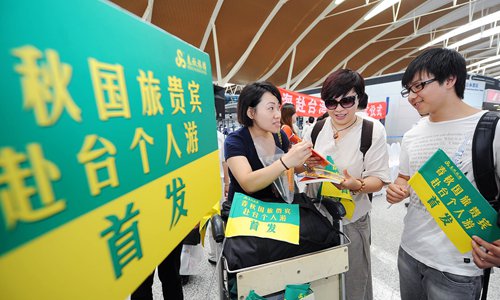HOME >> OPINION
DPP’s extreme policies hurting island
Source:Global Times Published: 2019/8/1 22:42:19

A guide introduces the do's and don'ts in the Taiwan Island to two mainland tourists of the very first group of individual visitors who left from Shanghai on June 28, 2011. Photo: IC
The Chinese mainland announced Wednesday that a pilot program allowing residents from 47 mainland cities to visit the island of Taiwan as individual tourists was set to be suspended starting August 1. The decision was made "in view of the current cross-Straits relations," the mainland explained. The Taiwan island authority responded quickly, accusing the mainland of exerting pressure on the island and impacting people-to-people exchanges through politics.
In the past three years, Tsai Ing-wen's authority has made no contribution to cross-Straits exchanges. Instead, suppressing and undermining such interactions has been the Democratic Progressive Party (DPP)'s basic line.
Aside from riding the US and Japan's coattails, the Tsai authority has launched a so-called New Southbound Policy, attempting to pull Taiwan away from the mainland by strengthening economic ties with ASEAN and Australia. "De-Sinicization" is an overt clamor raised by Tsai and her team.
The Tsai authority's retrogression on cross-Straits relations has seriously undermined cross-Straits cooperation in various fields, including promoting mainland visitors' individual trips to Taiwan. Current cross-Straits cooperation relies mainly on previously existing projects. With an increasingly broken political foundation, whether these projects can continue is uncertain.
Individual trip was opened up by the previous Taiwan authority. Almost 10 years after, individual tourists account for around 60 percent of mainland visitors to the island. If cross-Straits ties develop normally, such a travel mode would definitely propel a strong increase in mainland tourists to Taiwan.
But the DPP authority has politicized mainland visitors in the past two years, considering their trips to Taiwan as the mainland's political and intelligence penetration. An increasing number of mainland tourists have been investigated and obstructed; some were even traced and monitored. As the island's "presidential election" approaches, it is highly possible that Taiwan secessionist forces will stir things up using mainland visitors.
Mainland tourists have made up around 25 percent of Taiwan's inbound tourists and brought great wealth to the island. But public opinion controlled by the pro-secession camp, and the DPP authority itself, has never shown any gratitude. The DPP has constantly incited anti-mainland sentiment, largely infecting ordinary Taiwan people's attitudes toward mainland visitors. Complaints from mainland tourists about the unfriendly treatment they received in Taiwan have increased drastically.
The mainland's decision to suspend the program demonstrates the government's responsibility for tourists' personal safety during the special period. Individual visitors are more prone to various attacks than those in tour groups. And they may fall into the trap set by Taiwan secessionist forces to undermine cross-Straits relations. Such preventive measures are quite necessary in the current situation.
The program was launched to benefit local economy, but the island's attitude has made it meaningless. The Tsai authority needs to bear the consequences of its frantic political line.
Suspending individual trips might cause inconvenience to some young people who planned to visit Taiwan. But we believe that people will understand the government's goodwill and sense of responsibility.
The government's decision is meant to safeguard national interests and people's fundamental interests. It is a necessary response to DPP's extreme cross-Straits policy.
Mainland tourists to the island are considered the epitome of cross-Straits exchanges. The DPP will cause Taiwan society to suffer losses by undermining such exchanges. This shows that the cross-Straits policies of Tsai and the DPP cannot be sustained long-term.
Posted in: EDITORIAL